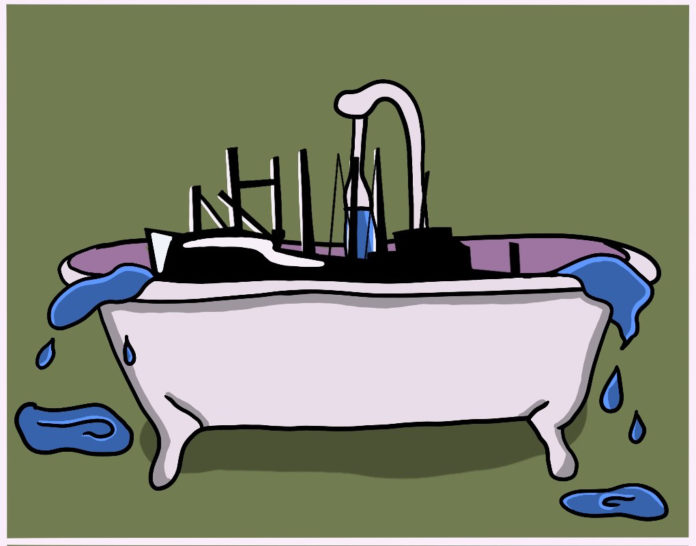The Suez Canal blockage highlights the need to live local
As you are almost definitely aware, on March 23, the Ever Given, a golden-class cargo ship, got wedged sideways in the Suez Canal, completely stopping marine traffic through the passage. The Suez Canal is a man-made waterway that runs from the Red Sea to the Mediterranean Sea. It was built to give ships travelling from Africa and Asia to Europe, which previously had to sail all the way around the Cape of Good Hope, a shortcut. While the Ever Given was stuck, she halted about 12 per cent of global trade. On March 29, the Ever Given was freed, sent on her merry way (to the next port for a thorough examination), and the 450 backlogged ships started being ushered through by Canal authorities.
For the people who have been endlessly doomscrolling (so, all of us) and for those who have all but given up on watching cable news since even the fluff pieces started being about COVID-19, the story of the Ever Given was refreshing — almost exhilarating. It was simple. It was concrete. After over a year of worrying about the invisible spectre of the novel coronavirus, breathing in Schrodinger’s miasma every minute of the day, and keeping track of numbers that are hard to wrap our heads around, what a luxury it is to have the biggest news story in the world be about a matter of mechanics. There is a big boat. The big boat is stuck. Other boats need to get past the big boat. We need to get the big boat unstuck — it’s poetry.
And, like the best news stories, the blocking of the Suez Canal will be the biggest pain in the neck for the very rich. Sure, gas might be a little more expensive in some places for a few months, but when people say “The cost will get passed on to the consumer,” what they really mean is that someone with more money than God is having a panic attack at the prospect of having slightly less money than God. Those of us who have, in comparison, basically no money (so, most of us) are free to enjoy gloating.
However, when you take a step back from the deluge of memes about the Ever Given, the incident is a glaring reminder of something that’s easy to forget: no matter how far we push ourselves into the digital age, we will never stop living in the actual, physical world.
The Ever Given is 100 metres longer than the Suez Canal is fully wide, which kind of makes it seem like allowing the ship through in the first place was something of a Jurassic Park moment — somebody got so preoccupied with whether or not they could, they didn’t stop to think if they should. The Ever Given getting stuck in the Suez Canal is just one example of the technology of globalization outgrowing the infrastructure, and the curtain being pulled back to reveal the fragility of monopolized, globalized, capitalist systems.
Globalization spreads and has been spread as a result of capitalism, a model of commerce geared solely toward profit. Until it becomes a pressing matter for the very rich, global trade will continue to largely rely on unsustainable technology with minimal investments in infrastructure and secure innovations like renewable energy. And, as we keep pushing unsustainable technology to new extremes — like huge container vessels and international oil pipelines — we will continue to be left with crises when they inevitably fail, the costs of which will be passed on to the consumer, the worker, and the Earth.
The strain placed on the environment by globalization is enormous. While there are many positives associated with globalization, like the spread of information and technology, globalized trade — which is what makes it so you can go to Winners and get a vial of Iranian saffron for $8.99 or buy a T-shirt made in Bangladesh for $4.99 at Walmart — necessitates the expenditure of exponentially more energy, leading to more pollution, never mind worker exploitation.
The story of the Ever Given is humorous and refreshing but also humbling and a little scary. As a species, we are capable of making a staggeringly huge boat that carries a cargo load worth more than the GDP of some countries, with containers stacked nearly flush to the sides of the hull, 10 layers high. But when that big boat gets stuck in some sand, we’re much more powerless to move it than we’d like to think. Yes, the Ever Given was freed after only six days, but experts were speculating about what would happen if it was stuck for weeks, because we simply didn’t know when we would be able to move it or how.
The physical systems propping up our economy of numbers are not stored on the Cloud; they are real, and breakable, and everywhere — you’ve probably seen the Ever Given or one of her sister vessels floating in English Bay on a beach day in Vancouver. But we can choose to be more grounded in the world of things. Supporting local producers of food, goods, services, and raw materials is important; it makes our ways of life not only more secure, but more sustainable. When you can, live local and support yourself, your community, and your planet.
(Celina Koops/The Cascade)


